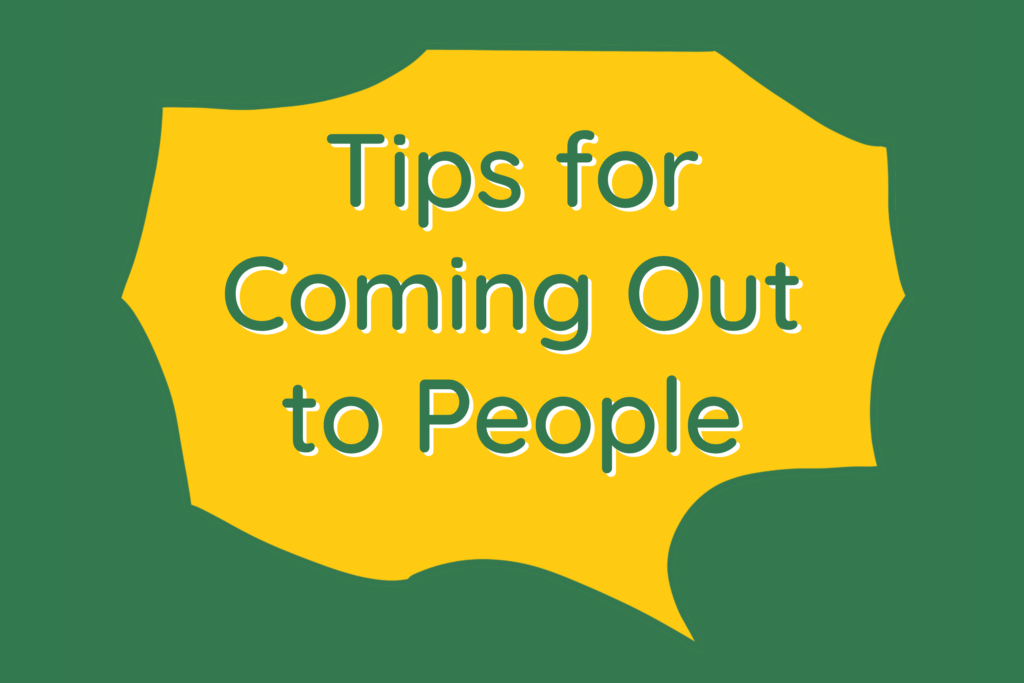Tips for Coming Out to People
by Andres Carrion | April 2021
Coming out is the process of revealing your sexual orientation and/or gender identity to yourself and to people you choose. People will come out to themselves, loved ones, and people they meet. Before coming out, it’s important to understand why you want to come out.
People come out to various people and for many reasons. Some reasons people choose to come out is to become closer with people in their lives or to live a more authentic life. Are you coming out because you’re angry and want to hurt the other person? Do you want to form a closer relationship with the other person? Do you want to live a more authentic and unapologetic life? Understanding why you want to come out to someone is a great first step in preparation for coming out.
A second important step to consider is your safety. It is not always safe to come out, as sexuality and gender identity are unfortunately still stigmatized in society and different people will have different reactions to your coming out. Many people usually have an idea already as to whether it is safe to come out, so if you do not feel safe, trust your gut instinct. Only you know when it is safe to come out, and only you can decide when to come out.
If you have decided to come out to someone, there are some things you can do to make the process a bit easier. You can try testing the waters with them by asking them their opinions on LGBTQIA+ issues like marriage equality, adoption and family formation, or general LGBTQIA+ rights. Another tip is to find the right time and place. Coming out to someone can be a lot to process for some people, so it’s important to have their attention in a neutral setting. This could be a time when you’re alone with them and you have their undivided attention. Provide them resources like PFLAG or other LGBTQIA+ educational resources. Finally, it is important to understand that the conversation may not go the way you would like. Many of these relationships get better and become more accepting over time. If the conversation does not go as planned, reach out to your support network (like friends and family who you’re out to), reach out to people you know who are already out, or your therapist. These people can be there for you and support you through this process.
Take-aways:
- Understand that coming out is an ongoing process, and only you can decide when you want to come out.
- Recognize why you want to come out, and make sure that it’s safe for you to do. If you don’t feel safe, trust your gut.
- Pick the right time to come out and make sure you have their full attention.
- If the conversation doesn’t go as planned, reach out to loved ones and your therapist for support.
Reaching out:
Clients from the Chicagoland area may choose in-office or online therapy and usually commute from surrounding areas such as River North, West Loop, Gold Coast, Old Town, Lincoln Park, Lake View, Rogers Park, Logan Square, Pilsen, Bridgeport, Little Village, Bronzeville, South Shore, Hyde Park, Back of the Yards, Wicker Park, Bucktown and many more.
At Roamers Therapy, our psychotherapists are here to support you through anxiety, depression, trauma and relationship issues, race-ethnicity issues, LGBTQIA+ issues, ADHD, Autism, or any challenges you encounter. Our psychotherapists are trained in Cognitive Behavioral Therapy, Dialectical Behavioral Therapy, Psychodynamic Therapy, Acceptance, and Commitment Therapy, Person-Centered Therapy, and Gottman Therapy.
Whether you’re seeking guidance on a specific issue or need help navigating difficult emotions, we’re ready to assist you every step of the way.
Contact us today to learn more about our services and schedule a session with our mental health professionals to begin your healing journey. To get started with therapy, visit our booking page.
First, decide if you’ll be paying out-of-pocket or using insurance. If you’re a self-pay client, you can book directly through the “Book Now” page or fill out the “Self-Pay/Out-of-network Inquiry Form.” If you’re using insurance, fill out the “Insurance Verification Form” to receive details about your costs and availability. Please let us know your preferred therapist. If your preferred therapist isn’t available, you can join the waitlist by emailing us. Once your appointment is confirmed, you’ll receive intake documents to complete before your first session.
This page is also part of the Roamers Therapy Glossary; a collection of mental-health related definitions that are written by our therapists.
While our offices are currently located at the South Loop neighborhood of Downtown Chicago, Illinois, we also welcome and serve clients for online therapy from anywhere in Illinois and Washington, D.C. Clients from the Chicagoland area may choose in-office or online therapy and usually commute from surrounding areas such as River North, West Loop, Gold Coast, Old Town, Lincoln Park, Lake View, Rogers Park, Logan Square, Pilsen, Bridgeport, Little Village, Bronzeville, South Shore, Hyde Park, Back of the Yards, Wicker Park, Bucktown and many more. You can visit our contact page to access detailed information on our office location.

